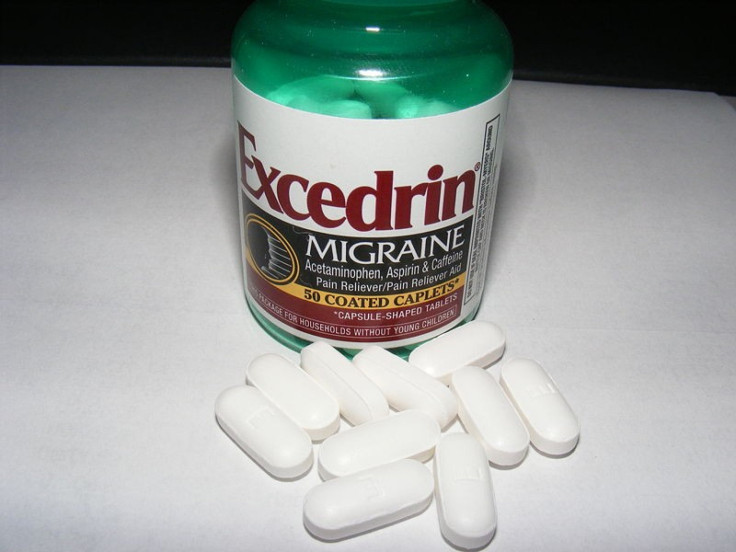Excedrin Recall 2012 and 5 Other Worse Drug Recalls in FDA History

Novartis Consumer Health Inc. on Sunday, voluntarily recalled Excedrin and NoDoz products in the United States because they may contain some stray tablets, capsules caplets from other Novartis products. There may also be some broken or chipped tablets inside the packages.
The company said the recall was done as a precautionary measure following complaints from consumer about broken or chipped pills and inconsistent bottle packaging line clearance practices.
There have been no related adverse events reported with the issues leading to the recall, Novartis, a Switzerland-based company, noted in a statement on its Web site. U.S. consumers are also asked to either destroy or return unused product identified in the recall to Novartis Consumer Health Inc.
Those products are Excedrin and NoDoz products with expiry dates of Dec. 20, 2014 or earlier as well as Bufferin and Gas-X Prevention products with expiry dates of Dec. 20, 2013 or earlier.
The company has since suspended operations and shipment from its Lincoln, Neb., facility in order to make improvements. The recall and improvement efforts are estimated at $120 million.
We are committed to a single quality standard for the entire Novartis Group and we are making the necessary investments and committing the right resources to ensure these are implemented across our entire network, said Joseph Jimenez, CEO of Novartis. The high quality of our products and operations has been critical to building the Novartis reputation over the past 15 years. We are committed to ensuring the highest standard for patients who rely on our products and medicines.
Those the 2012 Excedrin recall has been making headlines this week, there have several other worse recalls in the history of the U.S. Food and Drug Administration.
Here are five of the worse recalls in FDA history, according to 247wallst.com:
1. Fenfluramine/phentermine (Fen-Phen): A popular weight loss drug that had an estimated 6.5 million people taking it to fight obesity.
Maker: Wyeth-Ayerst Laboratories
Recalled: 1997 (after 24 years on the market)
Financial damage: Awards to victims close to $14 billion, therefore, making it one of the most costly products liability cases in history.
2. Diethylstilbestrol (DES): It was prescribed for more than 30 years to prevent miscarriages and other pregnancy complications. However, in 1971 it was linked to a rare tumor that kept appearing in the daughters of women took that drug.
Maker: Multiple manufacturers (DES was never patented as it was created with British public funds)
Recalled: 1975 (after 37 years on the market)
Financial damage: Steep, but difficult to quantify because each manufacturer paid out legal damages correlated with its respective market share (a new way of awarding damages in these cases).
3. Cerivastatin (Baycol): This was prescribed to patients as a treatment for high cholesterol and is reportedly responsible for more than 100,000 deaths and plenty of lawsuits. This drug was linked to severe muscle disorder known as rhabdomyolysis. This disorder clogs the kidneys with protein from dying muscle tissue.
Maker: Bayer
Recalled: 2001 (after four years on the market)
Financial damage: Litigation-related damages totaled $1.2 billion
4. Rofecoxib (Vioxx): This is considered to be the largest drug recall in history. According to 247wallst.com, this drug also caused one of the greatest public outcries. It was prescribed to more than 20 million people as a pain reliever for arthritis. However, it was found to be responsible for an increased risk of heart attack and stroke and both Merck and the FDA were criticized for ignoring evidence of the dangers of using this drug before the big recall. Reports are that some 140,000 people in the U.S. alone could have suffered from serious coronary heart disease because of taking this drug.
Maker: Merck
Recalled: 2004 (after five years on the market)
Financial damage: nearly $6 billion in litigation-related expenses alone.
5. Valdecoxib (Bextra): Bextra is anti-inflammatory drug prescribed for treating arthritis and pain from other inflammatory disorders. It was removed from the market because of the same concerns regarding Vioxx i.e. increased risk of heart attack and stroke.
Maker: Pfizer
Recalled: 2005 after just one year on the market.
Financial damage: Over $2 billion in legal awards and expenses.
You can read the rest of the recall list here.
© Copyright IBTimes 2025. All rights reserved.






















